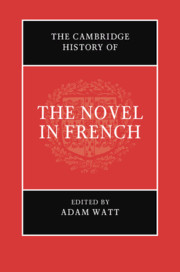Book contents
- The Cambridge History of the Novel in French
- The Cambridge History of the Novel in French
- Copyright page
- Contents
- Figures
- Contributors
- Acknowledgements
- Note on Conventions
- Chronology
- Introduction
- Part I Beginnings: From the Late Medieval to Madame de Lafayette
- Part II The Eighteenth Century: Learning, Letters, Libertinage
- 7 The Early French Novel and the Circum-Atlantic
- 8 Anglo-French Relations and the Novel in the Eighteenth Century
- 9 The Fiction of Diderot and Rousseau
- 10 The Memoir Novel
- 11 Epistolary Fiction: The Novel in the Postal Age
- 12 The Libertine Novel
- 13 Sade and the Novel
- Part III After the Revolution: The Novel in the Long Nineteenth Century
- Part IV From Naturalism to the Nouveau Roman
- Part V Fictions of the Fifth Republic: From de Gaulle to the Internet Age
- Index
- References
7 - The Early French Novel and the Circum-Atlantic
from Part II - The Eighteenth Century: Learning, Letters, Libertinage
Published online by Cambridge University Press: 04 February 2021
- The Cambridge History of the Novel in French
- The Cambridge History of the Novel in French
- Copyright page
- Contents
- Figures
- Contributors
- Acknowledgements
- Note on Conventions
- Chronology
- Introduction
- Part I Beginnings: From the Late Medieval to Madame de Lafayette
- Part II The Eighteenth Century: Learning, Letters, Libertinage
- 7 The Early French Novel and the Circum-Atlantic
- 8 Anglo-French Relations and the Novel in the Eighteenth Century
- 9 The Fiction of Diderot and Rousseau
- 10 The Memoir Novel
- 11 Epistolary Fiction: The Novel in the Postal Age
- 12 The Libertine Novel
- 13 Sade and the Novel
- Part III After the Revolution: The Novel in the Long Nineteenth Century
- Part IV From Naturalism to the Nouveau Roman
- Part V Fictions of the Fifth Republic: From de Gaulle to the Internet Age
- Index
- References
Summary
This chapter provides an overview of the French circum-Atlantic novel, as written primarily by metropolitan whites, between 1697 and 1807—the period in which both the French novel and French slavery evolved. The chapter links canonical novels, such as Prevost's Manon Lescaut and Voltaire's Candide, to the major themes and narrative mapping of less well-known colonial fictions by Alexandre-Olivier Oexmelin, Jean-François de Saint-Lambert, Germaine de Staël, and Jean-Baptiste Picquenard, and others. The chapter summarizes some of the major critical explanations for the relative paucity of representations of slavery in eighteenth-century French fiction as well as some accounts of colonial reading and writing among whites and people of colour in French Caribbean colonies. It argues that the French circum-Atlantic novel evolved as an imaginative space in which chattel slavery was transformed into an aesthetic atmosphere for depicting human enslavement to passion rather than human enslavement to humans. Emerging as the characteristic element of this fiction, the harangue spoken by the revolting slave leader or abused woman of colour translated historical slavery into a colonial hamartia, the internal flaw or enslavement to destiny.
- Type
- Chapter
- Information
- The Cambridge History of the Novel in French , pp. 133 - 151Publisher: Cambridge University PressPrint publication year: 2021



